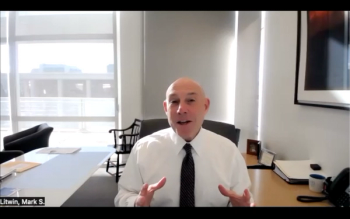
Here’s to 15 minutes for doing things that matter
"Let’s hope that the new government changes allow those of us in the trenches of urology to spend more time with our patients so we can use our 15 minutes doing things that matter, like actually take care of our patients," writes Henry Rosevear, MD.
Dr. Rosevear is a urologist in community practice in Colorado Springs, CO. Urology Times blogs present opinions, advice, and news from urologists and other urology professionals. Opinions expressed by bloggers are their own, and do not necessarily reflect the views of Urology Times or its parent company, MJH Life Sciences.
15 minutes. 900 seconds. If you’re a bull rider, that is an eternity. But for a physician meeting a patient for the first time, it’s the blink of an eye. Why? During that first visit with a patient, I need to establish a personal connection with the patient, figure out why they are in my office and what I can do about it, review any relevant imaging tests or labs, and-oh-by-the-way-ask a bunch of medically irrelevant questions that I’m required to ask and document only for billing purposes.
And let’s not forget that I have to get all that information into the medical record so I can pay my staff.
Easy, right?
I’m not a huge fan of the TV show “House,” but I do love one particular scene where Dr. House encounters a young woman with poorly controlled asthma and learns that she is using her inhaler more akin to a perfume applier. (Check YouTube for “Dr. House asthma inhaler” if you haven’t seen this scene; it’s hilarious).
This is not a blog about how best to communicate with your patient; those who know me would find communication tips coming from me comical at best. Rather, I wanted to point out the economic forces that are working to make the situation worse and discuss some potential changes in government regulations that may actually make the situation better.
To administrators, we’re widgets
First, the bad news. Let’s just accept that hospital administrators think of us as widgets. Administrators may claim to care about “quality” and “experience,” but when push comes to shove, one warm body is the same as another. Need an example? A hospital system near me is desperate to hire urologists. They have tried recruiting experienced urologists and failed, and now they are dangling lots of money at freshly minted urologists, hoping someone will be dumb enough to try to start a urology group. Good luck with that strategy, and I’m sorry for any patients who are hurt along the way.
Also by Dr. Rosevear:
In the end, until we as a community can agree on verifiable measures of quality and have these measures available publicly to patients who can then make informed decisions on their providers based on actual data and not on advertising, large hospitals will continue to look for the cheapest common denominator when it comes to physicians. But this system is not sustainable.
And since pay is often related to productivity, that sounds like a recipe for burnout. Work more, get paid less. Brilliant strategy. Further,
Next:
How about the good news? Believe it or not, the government may be moving toward helping us on two separate fronts. First, the Department of Health and Human Services is considering
For those not familiar with it, the Stark law started as a prohibition against medical practices sharing laboratories. It later expanded to other “designated health services.” The argument was that allowing multiple practices to share a lab increases the financial incentive for unnecessary referrals for tests. The counterargument is that allowing a practice to have its own internal lab could create efficiencies and facilitate faster turnaround times.
But with professional revenue flatlining, many groups have started to consider mergers as a way around the Stark law, given the in-office ancillary exception. An update to the Stark law has the potential to allow groups to maintain their independence while combining with other specialties to share the costs of expanding into various designated health services.
Read -
Additionally, CMS is on the verge of making some
Here’s an example: Let’s say it’s 0200 and you meet a 40-year-old man in the ER with a 9-mm distal ureteral stone who is not infected and whose pain cannot be controlled by the ER staff. Sounds like he needs ureteroscopy. When I’m talking to this patient, I ask if anyone in his family has ever had stones in the past. I want to know about any family history of stones.
Why? Is his answer in anyway going to change the procedure I’m about to do? No, of course not. I do it so that I can document a family history because without a family history I can’t bill a level four visit. And there are numerous other examples of redundant or extraneous documentation requirements that the proposed changes may eliminate.
Let’s hope that the new government changes allow those of us in the trenches of urology to spend more time with our patients so we can use our 15 minutes doing things that matter, like actually take care of our patients.
We want to hear from you! Send your comments to Dr. Rosevear c/o Urology Times at
Newsletter
Stay current with the latest urology news and practice-changing insights — sign up now for the essential updates every urologist needs.






